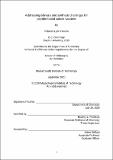Addressing delivery and synthesis challenges for peptide-based cancer vaccines
Author(s)
Holden, Rebecca Lynn.
Download1227521731-MIT.pdf (8.112Mb)
Other Contributors
Massachusetts Institute of Technology. Department of Chemistry.
Advisor
Bradley L. Pentelute.
Terms of use
Metadata
Show full item recordAbstract
Therapeutic peptide vaccines have the potential to elicit and direct an anti-cancer T cell response, but their clinical efficacy has been limited in part by poor delivery to the lymphatic system, inefficient cell uptake, and scalable synthesis in the case of personalized vaccines. The work presented in this thesis explores several approaches to address these challenges. First, we use our fast-flow automated synthesis technology to confront the synthesis bottleneck for patient-specific 'neoantigen' vaccines, which have shown early promise but are hindered by slow production. We synthesize a particularly challenging set of peptides from a previous clinical trial as a test case, demonstrating that our technology can produce the majority of sequences in sufficient quantities with comparable or higher purity than a commercial vendor in a fraction of the time. Turning towards vaccine design, we explore several approaches to address the lymphatic and intracellular delivery of peptide antigens. We demonstrate the generality and anti-tumor efficacy of vaccines containing cell-penetrating peptides (CPPs), sequences shown to enhance the cell uptake of various cargo. We characterize their mechanism and identify several unanticipated contributors, namely trafficking to the lymph nodes, serum stability, and extended presentation in vivo. We then expand on an existing approach to mediate lymphatic trafficking via binding serum albumin by exploring additional albumin binding moieties. Next, we develop a straightforward and general approach to directly quantify antigen presentation and implement this technique to explore two strategies to design more effective vaccines, including CPPs. Finally, we build on previous work using CPPs to deliver antisense oligonucleotides (ASOs), another application that we pursued in tandem with cancer vaccines. We combine amphipathic and cationic CPPs to create chimeric sequences that synergistically enhance activity of an ASO and access new routes of uptake not utilized by either parent CPP. Drawing from our experience using CPPs to deliver ASOs as well as our expertise in peptide synthesis and design, we provide insight into the rapid production of personalized vaccines and efficient delivery of vaccine antigens. This thesis represents a new area of research for our lab, one in which we will hopefully continue to apply our unique skillset and perspective.
Description
Thesis: Ph. D., Massachusetts Institute of Technology, Department of Chemistry, September, 2020 Cataloged from student-submitted PDF of thesis. Includes bibliographical references.
Date issued
2020Department
Massachusetts Institute of Technology. Department of ChemistryPublisher
Massachusetts Institute of Technology
Keywords
Chemistry.